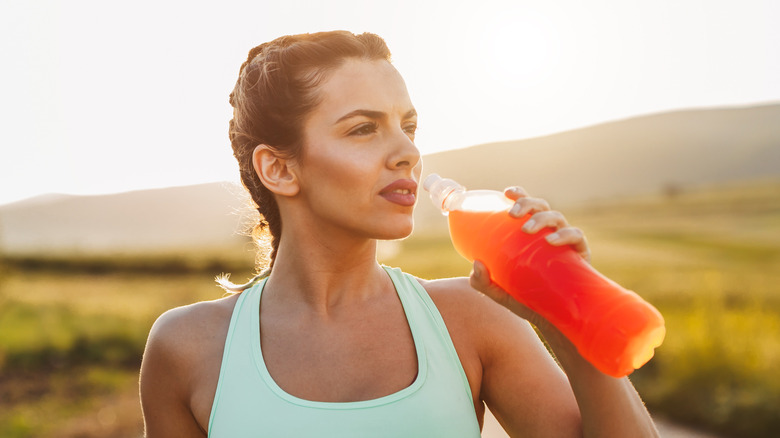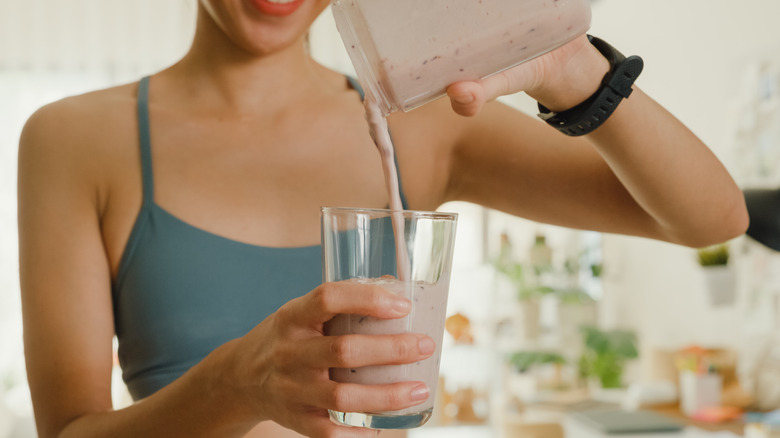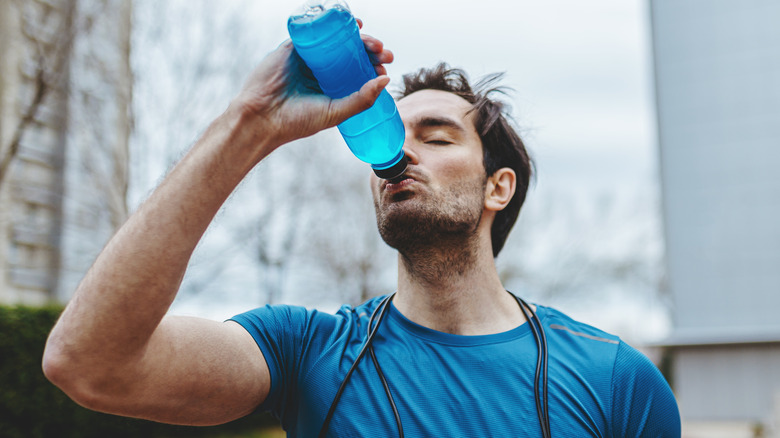The Healthiest Energy Drinks You Can Buy At The Grocery Store, According To Our Nutritionist
There's no shortage of energy drinks on the market. From beverages in shiny, multi-colored cans to drinks that come in cutely packaged bottles, you're bound to see a ton, no matter which grocery store you visit. This is why we asked our nutritionist, Dr. Amy Lee, Head of Nutrition for Nucific, for some exclusive input about the healthiest beverages out there. As it turns out, there are three energy drinks you can buy that can actually be good for you: AG1, Ka'Chava, and Celsius.
AG1 by Athletic Greens is a nutritional supplement that is no stranger to those who follow YouTubers or TikTok influencers. You've probably seen the green and healthy juice being promoted on lifestyle platforms like Kara and Nate and Eamon and Bec. Marketed as a nutritional powerhouse that fills gaps in your diet, AG1 contains 75 ingredients that your body can easily absorb, according to their website, including multivitamins, minerals, prebiotics, probiotics, antioxidants, functional mushrooms, and digestive enzymes. Ka'Chava is a plant-based protein blend with ingredients like spinach, coconut, ginger, oats, chia seeds, and shiitake. In addition to vitamins, minerals, probiotics, and digestive enzymes that support gut health, Ka'Chava beverages contain fiber and electrolytes. The drink comes in five flavors: coconut acai, chocolate, vanilla, chai, and matcha. Lastly, Celsius, largely marketed as an energy drink for active lifestyles, is made up of ingredients like green tea extract, guarana seed extract, ginger root, vitamin B, and vitamin C.
What makes some energy drinks healthier than others?
While you may not think much about the ingredient list at the back of an energy drink can or bottle, you can tell a lot by delving into each item listed there.
According to Dr. Amy Lee, ingredients like so-called "superfoods," digestive enzymes, vitamins, minerals, antioxidants, prebiotics, and probiotics are what set some energy drinks apart health-wise when compared to other options on the market. Superfoods include leafy greens, fruits, cruciferous vegetables, and nuts, while digestive enzymes are proteins your body uses to break down food. You can find them naturally in foods like honey, mangoes, papaya, and avocados. Antioxidants play the all-important role of fighting free radical damage in your system. They prevent heart disease, diabetes, and cancer, to name a few. Your body needs a good balance of probiotics and prebiotics to ensure optimal gut health. A healthy gut is a prerequisite for a lot of important health-related things, like a good immune system, digestion, sleep, and mood, and warding off diseases like inflammatory bowel disease and autoimmune conditions.
"These ingredients serve as cofactors in the body to optimize other metabolic pathways. The body also recognizes these ingredients as we eat them in foods so they're effective and aren't just words on a bottle or can," explained the nutritionist. So, if you want to include energy drinks in your diet, you're better off looking for ones that contain these ingredients.
What ingredients should you be avoiding in energy drinks?
When it comes to ingredients that should raise a red flag in your head, Dr. Amy Lee shared that large doses of caffeine and sugar alternatives such as aspartame make up the list. "These are artificial, and the body has to work harder to break it down before utilizing them," according to the nutritionist. Even with non-caloric sweeteners, there is a danger that your body will start craving more food, said Dr. Lee, "as it tricks the body in tasting sweet but without the calories."
Energy drinks are controversial, to say the least. Their high sugar content and sometimes alarming caffeine concentration are common concerns. When it comes to caffeine, while there's nothing wrong with moderate consumption, unusually large doses (over 400 milligrams) can be damaging to your health. While AG1 supposedly has a negligible amount of caffeine and Ka'Chava claims to contain very little from cocoa powder and green tea leaves, Celsius has 200 milligrams of caffeine per can. All three of these energy drinks claim to contain no artificial flavors, sweeteners, or additives.
While not everyone turns to energy drinks to round out their diet or acquire a quick pick-me-up before a workout or late night at the office, it's good to know that there are healthier alternatives out there. Ultimately, the beverages suggested by the nutritionist do seem like good options if you want to move toward a healthier diet.



